#features of OOPs in java
Explore tagged Tumblr posts
Text
what are Features of OOPs in java
Introduction
A programming paradigm known as object-oriented programming, or OOP, use objects to represent concepts and real-world phenomena. The behaviors (methods) and attributes (data) of an object determine its functionality and state. OOP makes abstraction, modularity, and code reuse possible. Among the primary characteristics of Java's OOP are:
Class: A class is an outline or template that specifies the shared characteristics and operations of a collection of objects. To create many instances of an object with the same attributes and behaviors, use a class. For instance, a class called Car may include methods like start(), stop(), accelerate(), and others, as well as characteristics like color, model, and speed. Constructors are unique methods that set an object's initial state when it is created; they may also be found in classes.

OOP, or object-oriented programming, is a type of programming
Object: An object is a particular state and behavior of an instance of a class. An object has the ability to call its own methods, access, and edit its own properties. Additionally, an object may communicate with other objects by sending them messages or using their methods. For instance, the class Car may be used to construct an object with the name myCar and unique values for the properties color, model, speed, etc. The start(), stop(), accelerate(), and other methods specified in the class Car can also be called by the object myCar.
A class can inherit the properties and methods of another class using the technique of inheritance. The subclass, often known as the kid class, is the class that inherits, and the The superclass or parent class is the one from which an inheritance is derived. Polymorphism and code reusability are made possible by inheritance. For instance, a class called Truck can inherit from the class Car and have all of the methods and attributes of the Car class in addition to having unique properties and methods of its own. Class Car is a superclass of class Truck, while the class Truck is a subclass of class Car.
Polymorphism: The capacity of an item to assume several forms based on the situation is known as polymorphism. Dynamic binding—in which an object's type is decided at runtime as opposed to compile time—is made possible via polymorphism. Overloading and overriding methods can be used to produce polymorphism. Overloading a method is when a There are several methods in a class with the same name but distinct arguments. Redefining a method that was inherited from a superclass by a subclass is known as method overriding. For instance, the drive() method of the class Truck may require an argument called load, but the drive() method of the class Car may require no parameters at all. The drive() function of the class Car is being superseded by the class Truck. Calling myVehicle is necessary if it is specified as a Car object but is really allocated to a Truck.Drive() will call the class Truck's drive() function rather than the class Car's.
Abstraction: The technique of revealing only an object's core characteristics while concealing the implementation details is known as abstraction. Maintainability, modularity, and simplicity are made possible via abstraction. Distraction may be accomplished by utilizing interfaces and abstract classes. A class that lacks the ability to be created and may have one or more abstract methods that need to be implemented by the subclasses since they lack a body. A class can implement an interface, which is a group of abstract methods, to conform to a specific behavior. For instance, an interface called Electric may have an abstract method called charge() that is bodyless, and an abstract class named Vehicle may have an abstract method named drive() that is bodyless. It is possible for a class called Tesla to inherit from the class Vehicle, implement the Electric interface, and offer the drive() and charge() methods. A Tesla class object has access to theThe internal workings of the functions drive() and charge() are not disclosed.
to know more you can vist here analytics jobs
1 note
·
View note
Text
Very amused every time someone discovers the ultimate way to do OOP in its truest, most polymorphic, most object-oriented form and its just immutable classes with public instance variables and no methods and no inheritance being transformed through singleton classes with no instance variables and one side-effect-free method, potentially taking a function as a parameter or returning another single method class. Brother you just reinvented functional programming.
#codeblr#progblr#object oriented programming#OOP#functional programming#Algebraic data types. Pure functions. Higher order functions. Closures. The gangs all here#And then whenever you tell them that what they did. they say its like functional programming but different because its polymorphic#Literally had a conniption when robert martin said he discovered clojure was actually an oop language because#it was better at polymorphism than java#This is without knowing the subtype polymorphic features in clojure
4 notes
·
View notes
Text
o hi i use both of them! in particular rust is my favorite programming language
rust: fast like C/C++ but memory management doesnt suck unlike C/C++
If any Haskell and or Rust fans follow me, give me 1 good reason to learn them
#ultimately it depends on what you find convincing#rust is less popular than languages like C C++ and java so if you want a job then eh#if you don't need the performance of C then sticking to higher-level OOP languages like java is fine#notably rust lacks proper inheritance (though it does have other OOP features like polymorphism & encapsulation)#so if u use inheritance a lot then thats a reason to Not use rust#rust has a couple more specific language features that i really love so lmk if u want me to expand on them#as for haskell if ur not interested in functional programming then it's probably not worth it ngl#im a massive fuckin nerd so i like it but it definitely took a LOT of effort compared to any procedural language!
33 notes
·
View notes
Text
there doesn't seem to be any single definition of oop (yes, Alan Kay coined the term, but *apparently* his definition is controversial), so i'll throw my hat in the ring with one: i think it's *just* encapsulation.
in contrast to procedural programming, i think the oo solution is simply binding data together with the methods that operate on it-- making a *new type*.
given two functions which 'add' to an array of strings, but with different semantics (e.g one acts a set, and acts one like list) the procedural solution is, imo, likely to just be making one function which has set-like semantics (pushset), and the other that has list semantics (pushlist), while just taking the underlying string array type as a parameter.
the oo solution would be to build two types-- a set type, and a list type, both with a function called add. these types would now be incompatible, which means you end up with less logic errors, since now it's much harder to use the wrong add function on the wrong array.
the way i've described the oo solution also opens doors to Java-like interfaces and polymorphism[1] and data hiding, which makes using the same underlying string array instance even harder[2], but encapsulation still seems to be the defining feature of oo in my eyes.
[1]: a good example is the *add* method found in Java's HashSet and ArrayList classes, which is required by the Collection interface [2]: or even impossible if there are no getters, and the class doesn't *take in* a reference to a string array to use during initialization
4 notes
·
View notes
Text
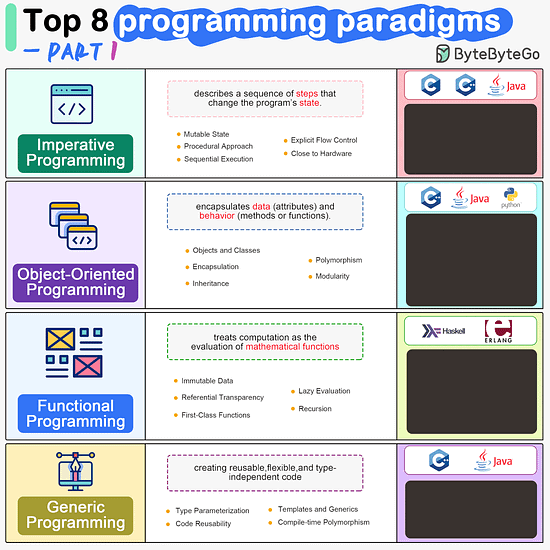
ByteByteGo | Newsletter/Blog
From the newsletter:
Imperative Programming Imperative programming describes a sequence of steps that change the program’s state. Languages like C, C++, Java, Python (to an extent), and many others support imperative programming styles.
Declarative Programming Declarative programming emphasizes expressing logic and functionalities without describing the control flow explicitly. Functional programming is a popular form of declarative programming.
Object-Oriented Programming (OOP) Object-oriented programming (OOP) revolves around the concept of objects, which encapsulate data (attributes) and behavior (methods or functions). Common object-oriented programming languages include Java, C++, Python, Ruby, and C#.
Aspect-Oriented Programming (AOP) Aspect-oriented programming (AOP) aims to modularize concerns that cut across multiple parts of a software system. AspectJ is one of the most well-known AOP frameworks that extends Java with AOP capabilities.
Functional Programming Functional Programming (FP) treats computation as the evaluation of mathematical functions and emphasizes the use of immutable data and declarative expressions. Languages like Haskell, Lisp, Erlang, and some features in languages like JavaScript, Python, and Scala support functional programming paradigms.
Reactive Programming Reactive Programming deals with asynchronous data streams and the propagation of changes. Event-driven applications, and streaming data processing applications benefit from reactive programming.
Generic Programming Generic Programming aims at creating reusable, flexible, and type-independent code by allowing algorithms and data structures to be written without specifying the types they will operate on. Generic programming is extensively used in libraries and frameworks to create data structures like lists, stacks, queues, and algorithms like sorting, searching.
Concurrent Programming Concurrent Programming deals with the execution of multiple tasks or processes simultaneously, improving performance and resource utilization. Concurrent programming is utilized in various applications, including multi-threaded servers, parallel processing, concurrent web servers, and high-performance computing.
#bytebytego#resource#programming#concurrent#generic#reactive#funtional#aspect#oriented#aop#fp#object#oop#declarative#imperative
8 notes
·
View notes
Text
Best IT Courses In Bhubaneswar:- seeree services pvt ltd.
Introduction:- seeree is one of the best IT training institute and Software industry, features completely Industrial training on Python , PHP , .NET , C Programming,Java , IOT , AI , GD PI , ORACLE and ALL CERTIFICATION COURSES as well as provides seminar,cultural activity and jobs
Courses we provided:- 1) Java Fullstack 2) Python Fullstack 3) PHP Fullstack 4) Preplacement Training & Sp. Eng 5) .NET Fulstack 6) SEO/Digital Marketing 7) SAP 8) MERN 9) Software Testing 10)Data Analyst 11)Data Science 12)Data Engineering 13)PGDCA 14)Tally 15)Graphics Design
Course1:- Java Fullstack

A Class in Java is where we teach objects how to behave. Education at seeree means way to success. The way of teaching by corporate trainers will bloom your career. We have the best java training classes in Bhubaneswar. 100% Placement Support. Job Support Post Training. This course will give you a firm foundation in Java, commonly used programming language. Java technology is wide used currently. Java is a programming language and it is a platform. Hardware or software environment in which a program runs, known as a platform. Since Java has its own Runtime Environment (JRE) and API, it is called platform. Java programming language is designed to meet the challenges of application development in the context of heterogeneous, network-wide distributed environment. Java is an object-oriented programming (OOP) language that uses many common elements from other OOP languages, such as C++. Java is a complete platform for software development. Java is suitable for enterprise large scale applications.]
Course2:- Python Fullstack

Seeree offers best python course in Bhubaneswar with 100% job assurance and low fee. Learn from real time corporate trainers and experienced faculties. Groom your personality with our faculty. Seeree helps to build confidence in students to give exposure to their skills to the company.
Python is dynamically typed , compiled and interpreted , procedural and object oriented , generalized , general-purpose , platform independent programming language. Python is a high-level, structured, open-source programming language that can be used for a wide variety of programming tasks.
Course3:- PHP Fullstack

seeree is the best training institute which provide PHP Training courses in bhubaneswar and all over odisha We aim the students to learn and grow altogether with the need of IT firms.
PHP is a server scripting language, and a powerful tool for making dynamic and interactive Web pages. PHP is a widely-used, free, and efficient alternative to competitors such as Microsoft's ASP.
Course4:- Preplacement Training & Sp. Eng

Welcome to SEEREE Institute, where excellence meets opportunity. At SEEREE, we are dedicated to providing a transformative learning experience that empowers students to achieve their goals and contribute to a brighter future.
Our institute offers cutting-edge courses designed to meet the needs of the ever-evolving global landscape. With a team of highly qualified instructors and state-of-the-art facilities, we ensure a supportive and inspiring environment for learning and growth.
Whether you're here to develop new skills, explore innovative fields, or pursue personal and professional success, SEEREE Institute is the perfect place to begin your journey. Thank you for choosing us, and we look forward to being a part of your success story.
Course5:- .NET Fullstack
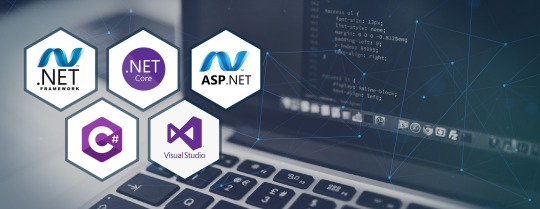
Seeree offers best .NET course in Bhubaneswar with 100% job assurance and low fee. Learn from real time corporate trainers and experienced faculties. Groom your personality with our faculty. Seeree helps to build confidence in students to give exposure to their skills to the company.
Course6:- SEO/Digital Marketing

In today's fast-paced digital world, businesses thrive on visibility, engagement, and strategic online presence. At SEEREE, we empower you with the skills and knowledge to master the art of Search Engine Optimization (SEO) and Digital Marketing.
Our comprehensive program is designed for beginners and professionals alike, covering everything from keyword research, on-page and off-page SEO, and content marketing, to social media strategies, PPC campaigns, and analytics.
With hands-on training, real-world projects, and guidance from industry experts, we ensure you're equipped to drive measurable results and excel in this dynamic field.
Join us at SEEREE Institute and take the first step towards becoming a leader in the digital marketing landscape!"
Course7:- SAP

SAP refers to Systems, Applications, and Products in Data Processing. Some of the most common subjects covered in these courses include human resource software administration, database management, and business training. Obtaining SAP certification can be done on a stand-alone basis or as part of a degree program.
Course8:- MERN

Seeree offers the best MERN course in Bhubaneswar with 100% job assurance and low fees. Learn from real-time corporate trainers and experienced faculty. Seeree helps students build confidence and gain skills to excel in company roles.
Are you ready to step into the exciting world of web development? At SEEREE, we bring you a comprehensive MERN Stack course that equips you with the skills to build modern, dynamic, and responsive web applications from start to finish.
The MERN Stack—comprising MongoDB, Express.js, React.js, and Node.js—is one of the most sought-after technologies in the web development industry. Our program is designed to help you master each component of the stack, from creating robust backends and managing databases to crafting dynamic frontends and seamless APIs.
Course9:- Software Testing

Seeree offers best Testing course in Bhubaneswar with 100% job assurance and low fee. Learn from real time corporate trainers and experienced faculties. Groom your personality with our faculty. Seeree helps to build confidence in students to give exposure to their skills to the company.
In the fast-paced world of software development, ensuring the quality and reliability of applications is crucial. At SEEREE, we offer a comprehensive Software Testing course designed to equip you with the skills and techniques needed to excel in this essential field.
Our program covers all aspects of software testing, from manual testing fundamentals to advanced automation tools and frameworks like Selenium, JIRA, and TestNG. You’ll learn to identify bugs, write test cases, execute test scripts, and ensure software meets high-quality standards.
With hands-on training, real-world scenarios, and guidance from experienced industry professionals, you’ll be prepared to take on roles like Quality Assurance Engineer, Test Analyst, and Automation Tester.
Join SEEREE Institute and gain the expertise to become a key player in delivering flawless software solutions. Your journey to a rewarding career in software testing starts here!"
Course10:- Data Analyst

Seeree offers the best Data Analyst course in Bhubaneswar with 100% job assurance and affordable fees. Our comprehensive curriculum is designed to cover all aspects of data analysis, from data collection and cleaning to advanced data visualization techniques. Learn from real-time corporate trainers and experienced faculty members who bring industry insights into the classroom. Enhance your analytical skills and boost your career prospects with hands-on projects and real-world case studies. Our faculty also focuses on grooming your personality and soft skills, ensuring you are well-prepared for interviews and workplace environments. Seeree is dedicated to building confidence in students, providing them with the necessary exposure to showcase their skills to top companies in the industry.
Course11:- Data Science

Seeree offers the best Data Science course in Bhubaneswar with 100% job assurance and affordable fees. Our comprehensive curriculum is designed to cover all aspects of data science, from data collection and cleaning to advanced data visualization techniques. Learn from real-time corporate trainers and experienced faculty members who bring industry insights into the classroom. Enhance your analytical skills and boost your career prospects with hands-on projects and real-world case studies. Our faculty also focuses on grooming your personality and soft skills, ensuring you are well-prepared for interviews and workplace environments. Seeree is dedicated to building confidence in students, providing them with the necessary exposure to showcase their skills to top companies in the industry.
Course12:- Data Engineering
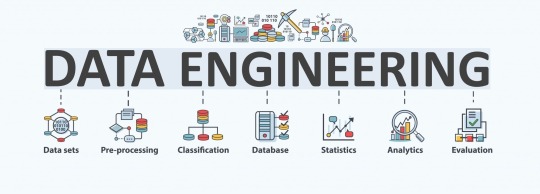
In the era of big data, the ability to design, build, and manage scalable data infrastructure is one of the most in-demand skills in the tech industry. At SEEREE, we are proud to offer a comprehensive Data Engineering course that prepares you for a career at the forefront of data-driven innovation.
Our program covers essential topics such as data modeling, ETL processes, data warehousing, cloud platforms, and tools like Apache Spark, Kafka, and Hadoop. You’ll learn how to collect, organize, and transform raw data into actionable insights, enabling businesses to make smarter decisions.
With real-world projects, expert mentorship, and hands-on experience with the latest technologies, we ensure that you are industry-ready. Whether you’re starting fresh or upskilling, this program will empower you to unlock opportunities in the rapidly growing field of data engineering.
Join SEEREE Institute and take the first step toward building the data pipelines that power tomorrow’s technology!"
Course13:- PGDCA

Seeree offers the best MERN course in Bhubaneswar with 100% job assurance and low fees. Learn from real-time corporate trainers and experienced faculty. Seeree helps students build confidence and gain skills to excel in company roles.
In today’s digital age, computer applications are at the heart of every industry, driving innovation and efficiency. At SEEREE Institute, our Post Graduate Diploma in Computer Applications (PGDCA) program is designed to provide you with in-depth knowledge and hands-on skills to excel in the IT world.
This program offers a comprehensive curriculum covering programming languages, database management, web development, software engineering, networking, and more. Whether you aim to enhance your technical expertise or step into a rewarding career in IT, PGDCA at SEEREE equips you with the tools to succeed.
With expert faculty, state-of-the-art labs, and real-world projects, we ensure that you gain practical experience and a strong theoretical foundation. By the end of the program, you’ll be prepared for roles such as software developer, system analyst, IT manager, or database administrator.
Course14:- Tally

Seeree offers the best Tally course in Bhubaneswar with 100% job assurance and low fees. Learn from real-time corporate trainers and experienced faculty. Seeree helps students build confidence and gain skills to excel in company roles.
In today’s business world, efficient financial management is key to success, and Tally is one of the most trusted tools for accounting and financial operations. At SEEREE Institute, we offer a comprehensive Tally course designed to equip you with the skills needed to manage business finances effortlessly.
Our program covers everything from the basics of accounting and bookkeeping to advanced features like GST compliance, inventory management, payroll processing, and generating financial reports. With hands-on training and real-world applications, you’ll gain practical expertise in using Tally effectively for businesses of any scale.
Whether you're a student, a professional, or a business owner, our Tally program is tailored to meet your needs and enhance your career prospects in the fields of accounting and finance.
Course15:- Graphics Design

In the world of creativity and communication, graphic design plays a vital role in bringing ideas to life. At SEEREE Institute, our Graphic Design course is tailored to help you unlock your creative potential and master the art of visual storytelling.
Our program covers a wide range of topics, including design principles, color theory, typography, branding, and user interface design. You’ll gain hands-on experience with industry-standard tools like Adobe Photoshop, Illustrator, and InDesign, enabling you to create stunning visuals for print, digital media, and beyond.
Whether you're an aspiring designer or a professional looking to sharpen your skills, our expert trainers and real-world projects will provide you with the knowledge and confidence to excel in this competitive field.
Join SEEREE Institute and start your journey toward becoming a skilled graphic designer. Let’s design your future together!"
2 notes
·
View notes
Text
Good Code is Boring
Daily Blogs 358 - Oct 28th, 12.024
Something I started to notice and think about, is how much most good code is kinda boring.
Clever Code
Go (or "Golang" for SEO friendliness) is my third or fourth programming language that I learned, and it is somewhat a new paradigm for me.
My first language was Java, famous for its Object-Oriented Programming (OOP) paradigms and features. I learned it for game development, which is somewhat okay with Java, and to be honest, I hardly remember how it was. However, I learned from others how much OOP can get out of control and be a nightmare with inheritance inside inheritance inside inheritance.
And then I learned JavaScript after some years... fucking god. But being honest, in the start JS was a blast, and I still think it is a good language... for the browser. If you start to go outside from the standard vanilla JavaScript, things start to be clever. In an engineering view, the ecosystem is really powerful, things such as JSX and all the frameworks that use it, the compilers for Vue and Svelte, and the whole bundling, and splitting, and transpiling of Rollup, ESBuild, Vite and using TypeScript, to compile a language to another, that will have a build process, all of this, for an interpreted language... it is a marvel of engineering, but it is just too much.
Finally, I learned Rust... which I kinda like it. I didn't really make a big project with it, just a small CLI for manipulating markdown, which was nice and when I found a good solution for converting Markdown AST to NPF it was a big hit of dopamine because it was really elegant. However, nowadays, I do feel like it is having the same problems of JavaScript. Macros are a good feature, but end up being the go-to solution when you simply can't make the code "look pretty"; or having to use a library to anything a little more complex; or having to deal with lifetimes. And if you want to do anything a little more complex "the Rust way", you will easily do head to head with a wall of skill-issues. I still love it and its complexity, and for things like compiler and transpilers it feels like a good shot.
Going Go
This year I started to learn Go (or "Golang" for SEO friendliness), and it has being kinda awesome.
Go is kinda like Python in its learning curve, and it is somewhat like C but without all the needing of handling memory and needing to create complex data structured from scratch. And I have never really loved it, but never really hated it, since it is mostly just boring and simple.
There are no macros or magic syntax. No pattern matching on types, since you can just use a switch statement. You don't have to worry a lot about packages, since the standard library will cover you up to 80% of features. If you need a package, you don't need to worry about a centralized registry to upload and the security vulnerability of a single failure point, all packages are just Git repositories that you import and that's it. And no file management, since it just uses the file system for packages and imports.
And it feels like Go pretty much made all the obvious decisions that make sense, and you mostly never question or care about them, because they don't annoy you. The syntax doesn't get into your way. And in the end you just end up comparing to other languages' features, saying to yourself "man... we could save some lines here" knowing damn well it's not worth it. It's boring.
You write code, make your feature be completed in some hours, and compile it with go build. And run the binary, and it's fast.
Going Simple
And writing Go kinda opened a new passion in programming for me.
Coming from JavaScript and Rust really made me be costumed with complexity, and going now to Go really is making me value simplicity and having the less moving parts are possible.
I am becoming more aware from installing dependencies, checking to see their dependencies, to be sure that I'm not putting 100 projects under my own. And when I need something more complex but specific, just copy-and-paste it and put the proper license and notice of it, no need to install a whole project. All other necessities I just write my own version, since most of the time it can be simpler, a learning opportunity, and a better solution for your specific problem. With Go I just need go build to build my project, and when I need JavaScript, I just fucking write it and that's it, no TypeScript (JSDoc covers 99% of the use cases for TS), just write JS for the browser, check if what you're using is supported by modern browsers, and serve them as-is.
Doing this is really opening some opportunities to learn how to implement solutions, instead of just using libraries or cumbersome language features to implement it, since I mostly read from source-code of said libraries and implement the concept myself. Not only this, but this is really making me appreciate more standards and tooling, both from languages and from ecosystem (such as web standards), since I can just follow them and have things work easily with the outside world.
The evolution
And I kinda already feel like this is making me a better developer overhaul. I knew that with an interesting experiment I made.
One of my first actual projects was, of course, a to-do app. I wrote it in Vue using Nuxt, and it was great not-gonna-lie, Nuxt and Vue are awesome frameworks and still one of my favorites, but damn well it was overkill for a to-do app. Looking back... more than 30k lines of code for this app is just too much.
And that's what I thought around the start of this year, which is why I made an experiment, creating a to-do app in just one HTML file, using AlpineJS and PicoCSS.
The file ended up having just 350 files.
Today's artists & creative things Music: Torna a casa - by Måneskin
© 2024 Gustavo "Guz" L. de Mello. Licensed under CC BY-SA 4.0
4 notes
·
View notes
Text
Mastering Java: Your Comprehensive Guide to Programming Excellence
Embarking on the journey of mastering Java is akin to entering a realm of endless possibilities. Java, a versatile and widely-utilized programming language, offers a broad spectrum of applications, from crafting web and mobile applications to powering robust enterprise systems. Whether you are a novice in the realm of coding or a seasoned programmer looking to broaden your skill set, the path to proficiency in Java is an exciting one.

In this comprehensive guide, we will be your guiding light through the intricacies of Java, starting from the foundational basics and progressing to the more advanced aspects of the language. Our objective is to equip you with the knowledge and skills that form a robust and unshakable foundation for your journey into the vibrant world of Java. Fasten your seatbelt as we embark on this exhilarating exploration, charting a course that will empower you to thrive in the ever-evolving landscape of software development.
Here's a 8-step guide to effectively learn Java
Step 1: Setting Up Your Development Environment
Your journey to becoming a proficient Java developer commences with setting up your development environment. The essential components are the Java Development Kit (JDK) and an Integrated Development Environment (IDE) like Eclipse or IntelliJ IDEA. These tools aren't just convenient; they're the gears that will drive your Java programming endeavors. They streamline the coding process, provide useful features, and offer an organized workspace, making your coding experience efficient and enjoyable.
Step 2: The Foundation - Learning the Basics
With your development environment ready, it's time to delve into the fundamental building blocks of Java. Begin by acquainting yourself with data types, variables, operators, and control structures. These are the nuts and bolts of the language, and a solid grasp of these concepts is essential. You'll find an abundance of online tutorials and beginner-friendly Java books to assist you at this stage.
Step 3: Navigating the World of Object-Oriented Programming (OOP)
The object-oriented programming (OOP) approach is well known in Java. To harness the true power of Java, immerse yourself in the world of OOP. Understand the concepts of classes, objects, inheritance, encapsulation, and polymorphism. This knowledge forms the bedrock of Java programming and enables you to design efficient, organized, and scalable code.
Step 4: Mastering Data Structures and Algorithms
Data structures (such as arrays, lists, and sets) and algorithms are the secret sauce behind solving real-world problems efficiently. As you progress, dive into the world of data structures and algorithms. These are the tools that will empower you to handle complex tasks and optimize your code. They're your go-to assets for creating efficient and responsive applications.
Step 5: The Art of Exception Handling
Java boasts a robust exception-handling mechanism. Understanding how to handle exceptions properly is not just an add-on skill; it's a vital aspect of writing reliable code. Exception handling ensures that your code gracefully manages unexpected situations, preventing crashes and delivering a seamless user experience.
Step 6: Exploring Input and Output Operations
In this step, you'll explore the realm of input and output (I/O) operations. Mastering I/O is crucial for reading and writing files, as well as interacting with users. You'll gain the ability to build applications that can efficiently process data and communicate effectively with users.
Step 7: Conquering Multi tasking
Java's support for multi tasking is a significant advantage. Understanding how to manage threads and synchronize their actions is vital for creating concurrent applications. Multithreading is the key to developing software that can handle multiple tasks simultaneously, making your applications responsive and scalable.
Step 8: Building Projects and Real-World Practice
Theory is only as valuable as its practical application. The final step involves applying what you've learned by building small projects. These projects serve as a proving ground for your skills and provide valuable additions to your portfolio. Whether it's a simple application or a more complex project, the act of building is where the real learning takes place.

As you step into this vibrant realm of Java, remember that continuous learning is the key to staying relevant and effective in the ever-evolving field of software development. Be open to exploring diverse applications, from web development to mobile apps and enterprise solutions, and never underestimate the power of hands-on practice. Building projects, no matter how small, will solidify your knowledge and boost your confidence.
In your quest to master Java, ACTE Technologies stands as a valuable ally. Their expert guidance and comprehensive training programs will sharpen your skills, boost your confidence, and pave the way for a rewarding career in software development. Whether you're embarking on your Java journey or looking to take your skills to the next level, ACTE Technologies offers the resources and support you need to thrive in the world of Java programming.
So, with Java as your trusty companion, and ACTE Technologies as your guide, the possibilities are boundless. Your journey is just beginning, and the world of software development awaits your innovation and expertise. Best of luck on your path to mastering Java!
9 notes
·
View notes
Text
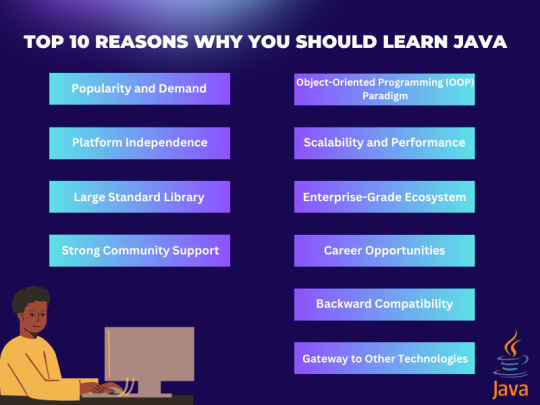
Top 10 Reasons Why You Should Learn Java Java is one of the most widely used programming languages in the world, known for its versatility and robustness. Java provides various features Have look at the top 10 reasons why you should learn Java: Popularity and Demand Platform Independence Large Standard Library Strong Community Support Object-Oriented Programming (OOP) Paradigm Scalability and Performance Enterprise-Grade Ecosystem Career Opportunities Backward Compatibility Gateway to Other Technologies
#besttraininginstitute#onlinetraining#traininginstitute#online#training#education#database#tutorial#coding#programming#java#top10#ten#topten#top#trend#trending#technology#educationplatform
2 notes
·
View notes
Text
☕ What Is Java?
Java is a high-level, object-oriented programming language used to build web apps, mobile apps (especially Android), enterprise software, and more. It's known for being platform-independent, secure, and robust.
💡 Java’s motto: “Write Once, Run Anywhere” – thanks to the Java Virtual Machine (JVM).
🚀 Why Learn Java?
FeatureBenefitPlatform-independentRuns on any OS (Windows, Mac, Linux) via JVMObject-OrientedEncourages clean, modular code with classes and objectsStrongly typedLess prone to runtime errorsMassive ecosystemFrameworks, libraries, and tools for all kinds of appsJob opportunitiesWidely used in large enterprises, banks, Android apps
📦 What Can You Build with Java?
Application TypeExampleWeb applicationsBanking apps, CMSs (e.g., Spring Boot)Mobile apps (Android)WhatsApp, Instagram, PaytmDesktop appsIDEs like IntelliJ, EclipseEnterprise softwareERP, billing systemsGame developmentMinecraft was originally built in JavaBig data + backendUsed in tools like Hadoop
🧱 Core Concepts in Java
ConceptDescriptionVariables & Data Typesint, String, double, boolean, etc.Operators+, -, *, /, ==, !=, &&, `Control Flowif, else, switch, for, while, do-whileMethodsFunctions in Java to organize codeObject-Oriented ConceptsClass, Object, Inheritance, Polymorphism, EncapsulationArrays & CollectionsStore data: ArrayList, HashMap, SetException HandlingTry-catch blocks to handle errors gracefullyFile I/ORead/write files using streams
🔧 Java Tools & Ecosystem
Tool/TechUseJDK (Java Development Kit)Core toolset for compiling and running JavaEclipse / IntelliJ IDEA / NetBeansIDEs (code editors for Java)Maven / GradleBuild automation and dependency managementSpring FrameworkPowerful backend framework for web appsJUnitUnit testing frameworkAndroid StudioBuild Android apps with Java or Kotlin
🧭 Learning Roadmap for Java (Beginner to Advanced)
✅ Step 1: Java Basics
Data types, variables, operators
Control structures: if-else, loops
Methods and basic input/output
✅ Step 2: Object-Oriented Programming (OOP)
Classes and objects
Inheritance, polymorphism, encapsulation
Interfaces and abstract classes
✅ Step 3: Intermediate Java
Exception handling
File handling
Collections framework (List, Set, Map)
Java 8+ features: Streams, Lambda expressions
✅ Step 4: Advanced Java
Multithreading and concurrency
JDBC (Java Database Connectivity)
Generics
Annotations
✅ Step 5: Java in Practice
Build mini-projects (e.g., calculator, student database, online quiz)
Explore Spring Boot for backend APIs
Use JavaFX for desktop apps or Android Studio for mobile
🧪 Example Mini Projects
Banking System Console App
Tic Tac Toe or Snake Game
Library Management System
Student Record System with File I/O
REST API using Spring Boot
0 notes
Text
How Java Powers Android App Development
Java has long been the foundation of Android app development. As one of the most popular and reliable programming languages in the world, Java continues to power millions of mobile apps. If you're aiming to build a career in mobile app development, especially on the Android platform, learning Java is essential. Getting started with the best Java training in Hyderabad can equip you with the skills and confidence to build robust Android applications from scratch.
Why Java is Still Relevant in Android Development
Even with the rise of Kotlin, Java remains a core language for Android development. It is trusted for its simplicity, scalability, and security features, which make it ideal for building mobile apps that need to perform consistently across devices.
Key Advantages of Java in Android:
Cross-platform compatibility with the JVM
Secure architecture and memory management
Extensive libraries that simplify development
Strong community support with endless resources
How Java Fits into the Android Ecosystem
Android apps built using Java rely on the Android SDK (Software Development Kit), which provides Java-based APIs to interact with mobile hardware and system functions. This setup allows developers to build full-featured apps using familiar Java syntax.
Java Helps You Develop Features Like:
User interfaces with XML + Java logic
SQLite-based local storage
Push notifications and background services
Camera, GPS, and sensor integrations
What You Learn When You Study Java for Android
Studying Java with a focus on Android will give you a well-rounded skill set, preparing you for both freelance projects and full-time job opportunities. You'll gain practical knowledge in:
Object-Oriented Programming (OOP)
Designing app layouts using XML
Handling user interactions and form validations
Working with APIs and databases
Publishing apps on the Google Play Store
These skills are in high demand for positions like Android Developer, Mobile App Engineer, or Full-Stack Developer.
Real-World Examples of Java-Based Android Apps
Many well-known Android apps have been built using Java due to its reliability and performance. Examples include:
Banking apps like SBI YONO and Axis Mobile
E-commerce apps like Flipkart and Amazon (Android versions)
Social media apps and chat applications
Educational apps for learning and assessments
Java's scalability allows these apps to serve millions of users with efficiency.
Conclusion
Java continues to play a powerful role in Android app development, offering a stable and efficient way to build interactive, scalable mobile applications. Whether you're starting from scratch or transitioning into mobile development, learning Java is a smart investment in your career. To get started with hands-on, practical training, join SSSIT Computer Education, where expert instructors guide you through real-world projects and job-ready skills. Turn your passion for technology into a professional Android development career today.
0 notes
Text
Is Object Oriented Programming Easier to Learn with the Guidance of a Mentor?
Object Oriented Programming (OOP) is a cornerstone of modern software development. From Python to Java and C++, the object-oriented approach is used to build scalable, modular, and reusable applications. Yet, for many beginners, object oriented programming can seem daunting. With its concepts of classes, objects, inheritance, encapsulation, and polymorphism, it's easy to feel overwhelmed.
This is where mentorship makes a huge difference.
At Silah, our mentorship platform connects aspiring developers with experienced professionals to guide them in their learning journey. But how exactly does having a mentor make learning object oriented programming easier? Let’s explore this.
What is Object Oriented Programming?
Before diving into how a mentor helps, let’s define object oriented programming.
OOP is a programming paradigm based on the concept of “objects,” which are data structures that contain data and methods. The core principles include:
Encapsulation – Binding data and methods that operate on the data into a single unit.
Inheritance – Deriving new classes from existing ones.
Polymorphism – Methods can take many forms based on context.
Abstraction – Hiding complex implementation details and showing only essential features.
Languages like Python, Java, C++, and Ruby support object oriented programming. Among these, object oriented programming python is often recommended for beginners due to its clean and readable syntax.
Why Object Oriented Programming is Hard to Learn Alone?
Despite being essential, many learners struggle with object oriented programming. Here’s why:
Abstract Concepts: Understanding inheritance or polymorphism without practical examples can be difficult.
Syntax Challenges: Each language implements OOP slightly differently.
Lack of Real-World Context: Learning OOP without real projects leads to shallow understanding.
Course Overload: Some object oriented programming courses dump too much theory with little application.
This is why mentorship becomes critical.
How a Mentor Makes Object Oriented Programming Easier?
Here’s how a mentor can enhance your learning experience with object oriented programming:
1. Personalized Learning Plan
Mentors assess your current skill level and tailor your learning. Instead of generic tutorials, you get focused guidance, especially if you're taking an object oriented programming online course.
2. Clarifying Complex Concepts
Struggling with the difference between class methods and instance methods? A mentor can provide clear, real-world examples in your chosen language especially useful when you're trying to learn object oriented programming python.
3. Project-Based Learning
Mentors encourage hands-on projects. This allows you to practice oop programming in a real development environment, solidifying your understanding.
4. Accountability and Motivation
Having someone to check your progress keeps you consistent. Mentors provide feedback and encouragement to help you stay on track with your oop course.
5. Industry Insights
Mentors bring experience from the software industry. They can help you understand how object oriented programming is used in large-scale applications, what hiring managers look for, and how to write clean, maintainable code.
Benefits of Object Oriented Programming Mentorship at Silah
At Silah, we go beyond courses. Our mentors are professionals who help you not just learn object oriented programming, but master it.
Whether you're enrolled in an object oriented programming course or learning independently, Silah can match you with a mentor to:
Answer technical questions in real-time.
Review your code and suggest improvements.
Provide resources like books, videos, and challenges.
Prepare you for job interviews focusing on OOP concepts.
We believe that one-on-one mentorship bridges the gap between theory and practice.
Learning OOP in Python with a Mentor
object oriented programming Python is one of the most popular choices for learners. Python’s simple syntax makes it easier to grasp complex OOP concepts.
A mentor can help you:
Build Python classes and understand constructors.
Implement inheritance and polymorphism with real examples.
Work on Python projects that follow OOP best practices.
With structured guidance, you'll avoid the pitfalls of self-learning and progress much faster.
Should You Learn Object Oriented Programming with a Mentor?
If you’ve ever felt stuck while learning oop programming, a mentor might be exactly what you need. Whether you're a college student, a bootcamp graduate, or a self-taught coder, mentorship can provide structure, direction, and encouragement.
With mentorship, object oriented programming becomes more than just theory it becomes a skill you can confidently apply.
FAQs About Learning Object Oriented Programming
What are the 4 basics of OOP?
Objects interact with each other using four basic principles: encapsulation, inheritance, polymorphism, and abstraction. These four OOP principles enable objects to communicate and collaborate to create powerful applications
Is Object Oriented Programming C or C++?
Language for creating large-scale applications. C++ is a superset of the C language. A related programming language, Java, is based on C++ but optimized for the distribution of program objects in a network such as the internet
Is Object Oriented Programming hard to learn?
Yes, it can be at first. Concepts like inheritance, polymorphism, and abstraction take time to understand. But with the right resources and especially with a mentor it becomes much easier.
What's the best language to learn Object Oriented Programming?
Python is often recommended due to its simplicity. Object Oriented Programming Python is beginner-friendly and widely used in industry.
Can I learn OOP without taking a course?
Yes, but structured learning helps. You can learn OOP via documentation, books, or videos, but an object oriented programming course or a mentor gives you a solid foundation.
How long does it take to learn Object Oriented Programming?
It varies. With daily practice and a mentor, you can learn the basics in 4–6 weeks. Mastery comes with time and real-world practice.
Can I get a job by just learning Object Oriented Programming?
OOP is a core skill in many jobs, but you also need to understand algorithms, data structures, and frameworks. Mentors can help prepare you for the full spectrum of technical interviews.
What’s the difference between OOP and procedural programming?
OOP focuses on objects and classes, while procedural programming focuses on functions and sequential execution. OOP is more suitable for large, complex systems.
Object Oriented Programming can be challenging to learn on your own. But with a mentor from Silah, you’re not alone. From breaking down complex concepts to guiding you through real projects, a mentor can accelerate your learning journey.
If you're looking to learn object oriented programming, explore our platform SilahPlatform.com and connect with mentors who care about your growth. Whether you're starting with object oriented programming python or taking an oop course, having someone by your side makes all the difference.
0 notes
Text
How effective is a 3-month Java course in Coimbatore for complete beginners?
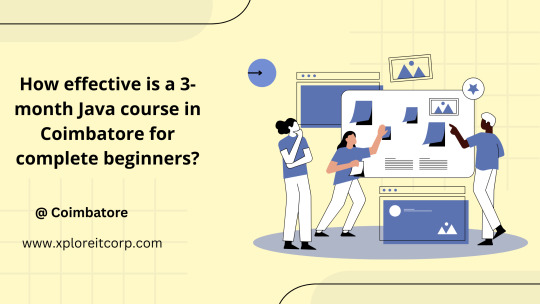
1. Introduction to Java for Starters
Java is the most popular programming language across the world. Most students frequently wonder, "How efficient is a 3-month Java course in Coimbatore for absolute beginners?" A well-structured course can speed up your learning with hands-on training, core knowledge, and expert guidance. For those learning from scratch, a comprehensive Java Course in Coimbatore provides the perfect gateway to coding and backend development.
2. Familiarity with the Java Universe
Before joining, it is important to know the extent of Java. Java is not limited to desktop applications—it's also used in web applications, Android applications, enterprise systems, etc. So when phrasing, "How effective is a 3-month Java course in Coimbatore for absolute beginners?", keep in mind that such courses will teach not only Java fundamentals but will also cover object-oriented programming and frameworks that are crucial for development.
3. What is Covered in a 3-Month Java Course
A 3-month Java Training in Coimbatore is generally geared to equip absolute beginners with fundamental programming skills. It usually covers Java basics, OOP principles, exception handling, file operations, JDBC, and a brief introduction to Java frameworks. When questioned "How effective is a 3-month Java course in Coimbatore for complete beginners?", the response lies in its capacity to render students project-ready within a short period.
4. Hands-On Training and Actual Projects
The distinguishing feature of a good Java Full Stack Developer Course in Coimbatore is practical exposure. Such courses focus on coding exercises, actual projects, and lab sessions. Through coding actual code and debugging mistakes, beginners gain confidence. How effective can a 3-month Java course in Coimbatore be for absolute beginners? Extremely effective—if it covers actual application development.
5. Developing a Strong Java Foundation
Principle knowledge is important. Without this, stepping into advanced subjects becomes difficult. A proper Java Training in Coimbatore helps you develop core programming concepts, which are prerequisites to understanding technologies such as Spring Boot, Hibernate, and RESTful APIs down the line. That's why students find it quite impressive that a 3-month course is so effective in launching their development journey.
6. Integration with Full Stack Development
A Java Full Stack Developer Course in Coimbatore that is well-integrated covers frontend technologies such as HTML, CSS, and JavaScript along with backend Java technologies. For freshers, this full-stack exposure within three months provides an advantage in placements as well as freelance work. So "How effective is a 3-month Java course in Coimbatore for complete beginners?" It offers depth and breadth in a small time interval.
7. Learning Through Mentorship and Peer Support
The classroom or online environment matters a great deal. With experienced mentors guiding and backed by peers, students learn more quickly. Java Training in Coimbatore typically involves group assignments, live Q&A sessions, and live code walkthroughs. These all increase engagement and retention, making the course even more valuable for beginners.
8. Career Opportunities After the Training
Once a Java Course in Coimbatore is completed, students qualify for positions such as Java Developer, Backend Developer, Software Engineer, or even Full Stack Developer. The 3-month duration is packed but intense enough to get ready for entry-level positions. This stands "How effective is a 3-month Java course in Coimbatore for complete beginners?" when the course work is job-oriented.
9. Role of Certification and Resume Creation
Employers value certification that reflects real skills. A certified Java Training in Coimbatore helps showcase your dedication and capability. Alongside technical training, many institutes offer resume building and interview prep. Some even complement tech training with soft skills or a Digital marketing training course in Coimbatore, to boost all-round employability.
10. Challenges and How to Overcome Them
Although the course is for beginners, issues such as coding logic, syntax issues, or APIs may occur. A proper Java Full Stack Developer Course in Coimbatore prepares you to tackle these with regular guidance and revision modules. So, "How effective is a 3-month Java course in Coimbatore for complete beginners?" Very effective—with proper mentorship and perseverance.
11. Why Coimbatore is a Great Place to Learn Java
Coimbatore has emerged as an emerging tech education destination. Institutes here provide industry-oriented Java Training in Coimbatore at reasonable prices with placement assistance. The ecosystem is conducive to learning, internships, and cooperation—making the place perfect for freshers to start their tech career.
12. Conclusion: Why Choose Xplore IT Corp
If you're thinking "How good is a 3-month Java course in Coimbatore for beginners?", the key rests in the right institution. Xplore IT Corp provides newbie-to-pro skills with live projects, skilled trainers, and placement. Whether you're signing up for a Java Course in Coimbatore, Java Training in Coimbatore, or a Java Full Stack Developer Course in Coimbatore, Xplore IT Corp offers a life-changing learning experience.
FAQs
1. Is it possible for a complete novice to learn Java in 3 months?
Yes, a structured course and regular practice can help novices acquire robust Java skills in 3 months.
2. How is Java Training different from a Full Stack Java Course?
Java Training is all about core Java, whereas a Full Stack Java Course covers frontend as well as backend development.
3. Do I have to be a program experience holder to enroll in a Java Course in Coimbatore?
No. No experience is needed. Courses are meant to begin from scratch.
4. Are placements offered after Java Training in Coimbatore?
Placement support is usually offered by most top-ranked institutes, including Xplore IT Corp, after training.
5. Is Java still popular in 2025?
Yes. Java is still a prime preference for enterprise-level applications, mobile applications, and cloud computing.
#core java#object-oriented programming#java syntax#java collections#java classes#java objects#inheritance in java#polymorphism in java#encapsulation#abstraction#java loops#java data types#java exceptions#java interfaces#java threads#java IDEs#eclipse for java#intellij idea#java vs python#java developer skills#java backend development#spring framework#java programming basics#java certification#java interview questions
0 notes
Text
Mastering C++ Without Meltdowns: A Realistic Guide for Students
C++ isn’t just another programming language — it’s the blueprint behind many of the world’s most powerful systems. But for students, mastering C++ can often feel like hitting one roadblock after another, especially when facing tight deadlines and complex homework.
Whether it’s confusing pointer logic, segmentation faults, or classes that just won’t compile, C++ homework can quickly turn into a frustrating experience.
So, what’s really going on — and how can you overcome it efficiently without burning out?
🚧 What Makes C++ Homework So Challenging?
C++ blends both low-level and high-level programming features. That gives it power but also introduces complexity:
You manually manage memory (unlike languages like Python or Java)
Syntax is strict, and one missing ; or wrong pointer can crash everything
You’re expected to understand both procedural and object-oriented paradigms
Concepts like recursion, inheritance, file handling, and templates are often layered into the same assignment
This means even a "simple" program can take hours if you're missing a single concept.
🔍 Common Student Struggles (and How to Tackle Them)
❌ Struggle: Managing dynamic memory allocation ✅ Tip: Always pair new with delete, and test in small code blocks.
❌ Struggle: Confusion with classes, objects, and inheritance ✅ Tip: Draw class diagrams and understand relationships before coding.
❌ Struggle: Debugging large, monolithic code ✅ Tip: Break code into smaller functions or classes, and compile/test often.
🎓 When It’s Time to Get Help
There’s a big difference between learning support and code copying. If you find yourself:
Spending hours without real progress
Not understanding the logic behind template classes or pointers
Repeating the same mistakes without knowing why
…then it's time to consider professional help. Guided assistance helps you learn smarter — with clean explanations, working code, and feedback tailored to your level.
That’s where C++ homework help becomes a valuable learning resource. Instead of guessing or Googling endlessly, you can get step-by-step support from professionals who’ve solved similar problems hundreds of times.
⚡ Tools, Topics, and Tasks We Commonly Help With
Pointers, references, and memory allocation
OOP concepts like inheritance and polymorphism
File I/O operations and exception handling
STL: vectors, maps, stacks, queues
Recursion and dynamic programming
Sorting, searching, and data structure implementation
Whether it's a simple class design or a complete data structure assignment, there’s support available for every challenge.
✅ Final Takeaway
C++ is tough — not because you’re not smart, but because it demands clear thinking and deep understanding. The good news? With the right approach, structure, and expert support, you can absolutely master it.
Don’t wait until the last minute. Break problems down. Practice regularly. And when you're stuck, reach out for help that strengthens your understanding — not shortcuts your success.
C++ doesn’t have to feel like a battle. With the right strategy, it can become one of your strongest skills.
0 notes
Text
Python Interview Questions for Beginners

Python is one of the most popular and beginner-friendly programming languages in the world. Known for its simple syntax, vast library support, and versatility, Python is widely used in web development, data science, automation, artificial intelligence, machine learning, and more. For beginners stepping into the software development world, Python is often the first language learned—and one of the most asked in job interviews.
If you're preparing for an entry-level software developer, data analyst, or backend programming role, it's crucial to understand the common Python interview questions that hiring managers may ask. This blog is designed specifically for beginners, covering basic to slightly advanced Python concepts with clear explanations, examples, and tips to help you succeed in your technical interviews.
Why Python for Beginners?
Python is popular because of its:
Simple syntax that mimics natural language
Huge standard libraries and third-party packages
Active community support
Use in multiple domains like web development, automation, and data science
Because of its readability and ease of learning, many tech companies use Python for interviews—especially for candidates just starting out.
What You'll Learn in This Blog
This guide includes:
Basic Python syntax and structure
Frequently asked beginner-level questions
Coding examples and logic building
Common mistakes to avoid
Preparation tips for freshers
Whether you’re a recent graduate or transitioning to a tech career, these Python interview questions for beginners will help you build confidence and prepare thoroughly.
Sample Python Interview Questions for Beginners
Let’s look at a few important questions with simple answers:
Q1. What is Python?
A: Python is a high-level, interpreted, general-purpose programming language. It supports object-oriented, procedural, and functional programming paradigms and is known for its simplicity and readability.
Q2. What are Python’s key features?
Easy to learn and use
Interpreted language
Dynamically typed
Extensive libraries and frameworks
Portable and open-source
Supports OOP (Object-Oriented Programming)
Q3. What are Python data types?
Common data types include:
int – Integer
float – Decimal numbers
str – Strings
bool – Boolean (True/False)
list, tuple, set, dict – Collection types
Q4. What is the difference between a list and a tuple?
A list is mutable (can be changed), declared with [].
A tuple is immutable (cannot be changed), declared with ().
my_list = [1, 2, 3] my_tuple = (1, 2, 3)
Q5. What are conditional statements in Python?
Conditional statements allow decision-making in code using: if condition: # do something, elif another condition: # do something else, else: # fallback
Q6. What are loops in Python?
Python supports for and while loops:# For loop example for i in range(5): print(i)
Q7. What is a function in Python?
A function is a block of code that performs a specific task:def greet(name): return "Hello, " + name
Q8. What is the difference between is and ==?
== checks value equality
is checks identity (object memory location)
Q9. What is indentation in Python?
Python uses indentation (spaces or tabs) to define code blocks. It is mandatory and replaces {} used in other languages.
Q10. How is Python different from other languages like Java or C++?
Python is interpreted, not compiled.
It has simpler syntax and fewer lines of code.
Python uses dynamic typing.
No need for explicit memory management.
Tips to Prepare for Python Interviews (as a Beginner)
Understand the basics thoroughly – Practice syntax, data types, loops, and functions.
Write code daily – Use platforms like HackerRank, LeetCode, or Replit to code simple problems.
Build mini-projects – Even small projects like calculators, to-do apps, or form validators show practical knowledge.
Revise common errors – Like indentation errors, mutable vs immutable types, etc.
Use mock interviews – Practice with peers or online interview simulators.
Useful Resources to Learn Python
Python Official Docs
FreeCodeCamp, Codecademy, W3Schools
YouTube channels like Programming with Mosh, Tech With Tim
Books: “Automate the Boring Stuff with Python” by Al Sweigart
Conclusion
Mastering Python interview questions for beginners is the first step toward launching your career in tech. By focusing on core concepts, writing clean code, and understanding how Python works behind the scenes, you’ll be well-prepared for any entry-level developer interview.
Remember, interviews are not just about the right answer — they’re about showing your approach, logic, and eagerness to learn. Keep practicing, stay curious, and you’ll soon land your first role in the tech world with confidence!
#PythonInterviewQuestions#PythonForBeginners#LearnPython#FresherInterview#TechInterviewPrep#PythonCoding#PythonBasics#ProgrammingJobs#InterviewTips#CareerInTech
0 notes
Text
Learn from the Best C++ Experts at DICS Laxmi Nagar

Are you passionate about programming and looking for a powerful language to begin your journey? Enroll in the Best C++ Course in Laxmi Nagar and take the first step toward a successful IT career. C++ is a foundational programming language that blends object-oriented and procedural programming concepts, making it ideal for beginners as well as advanced developers.
Why Choose a C++ Course?
C++ has been the backbone of many large-scale applications, game engines, operating systems, and real-time systems. Learning C++ not only strengthens your programming base but also enhances your logic-building and problem-solving skills. With a strong grasp of C++, you can easily transition into learning other languages like Java, Python, or C#. Whether you're a student, working professional, or someone aspiring to enter the tech world, this course opens vast opportunities in software development, game development, competitive programming, and system-level programming.
Scope and Future of C++
The demand for skilled C++ developers remains steady across various industries such as fintech, gaming, embedded systems, and robotics. After completing the best C++ course, students can pursue roles such as Software Developer, Game Developer, System Architect, and Application Programmer. Moreover, C++ is heavily used in competitive coding and interviews at top tech companies like Google, Microsoft, and Amazon.
Course Modules Covered in Best C++ Course in Laxmi Nagar:
Introduction to Programming and C++
History and features of C++
Setting up IDE
Basic Syntax and Structure
Variables, data types, and operators
Input/Output handling
Control Structures
Conditional statements
Loops: for, while, do-while
Functions and Recursion
Function declaration and definition
Recursion and inline functions
Arrays and Strings
1D, 2D Arrays
String manipulation
Object-Oriented Programming (OOP)
Classes and Objects
Constructors and Destructors
Inheritance and Polymorphism
Encapsulation and Abstraction
Pointers and Memory Management
Pointers and dynamic memory
References
File Handling in C++
Reading from and writing to files
File operations
Templates and Exception Handling
Function and class templates
Try, catch, throw statements
Project Work & Interview Preparation
Real-world C++ project
Practice questions and mock interviews
Why DICS is the Best C++ Institute in Laxmi Nagar?
DICS Computer Education provides hands-on training with expert faculty, personalized mentoring, and industry-ready projects. Our Best C++ Institute in Laxmi Nagar is designed with the latest curriculum and flexible batches for students and working professionals. With high placement support and certification, DICS ensures your learning experience turns into a career breakthrough.
#BestCPlusPlusCourse#CPlusPlusInstituteLaxmiNagar#LearnCpp#CPlusPlusProgramming#CppTrainingDelhi#TopCppCourse#CodingInCPlusPlus
0 notes